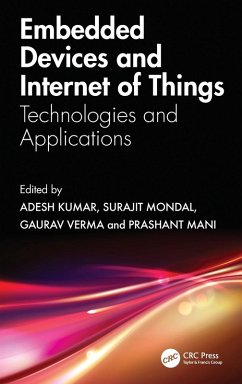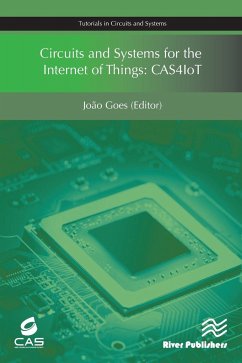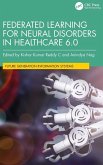Embedded Devices and Internet of Things
Technologies, and Applications
Herausgeber: Kumar, Adesh; Mani, Prashant; Verma, Gaurav; Mondal, Surajit
Embedded Devices and Internet of Things
Technologies, and Applications
Herausgeber: Kumar, Adesh; Mani, Prashant; Verma, Gaurav; Mondal, Surajit
- Gebundenes Buch
- Merkliste
- Auf die Merkliste
- Bewerten Bewerten
- Teilen
- Produkt teilen
- Produkterinnerung
- Produkterinnerung
The text discusses machine-to-machine communication in real-time, low-power system design and estimation using field programmable gate arrays, PID, hardware, accelerators, and software integration for service applications. It also covers the recent advances in embedded computing and IoT for healthcare systems.
Andere Kunden interessierten sich auch für
![DSP Processor Fundamentals DSP Processor Fundamentals]() Phil LapsleyDSP Processor Fundamentals165,99 €
Phil LapsleyDSP Processor Fundamentals165,99 €![Circuits and Systems for the Internet of Things Circuits and Systems for the Internet of Things]() Circuits and Systems for the Internet of Things98,99 €
Circuits and Systems for the Internet of Things98,99 €![Inside the FFT Black Box Inside the FFT Black Box]() Eleanor ChuInside the FFT Black Box220,99 €
Eleanor ChuInside the FFT Black Box220,99 €![Federated Learning for Neural Disorders in Healthcare 6.0 Federated Learning for Neural Disorders in Healthcare 6.0]() Federated Learning for Neural Disorders in Healthcare 6.0206,99 €
Federated Learning for Neural Disorders in Healthcare 6.0206,99 €![Applied Signal Processing Applied Signal Processing]() Nadder HamdyApplied Signal Processing137,99 €
Nadder HamdyApplied Signal Processing137,99 €![Volumetric Image Analysis Volumetric Image Analysis]() Gabriele LohmannVolumetric Image Analysis260,99 €
Gabriele LohmannVolumetric Image Analysis260,99 €![Smart Card Manufacturing Smart Card Manufacturing]() Yahya HaghiriSmart Card Manufacturing173,99 €
Yahya HaghiriSmart Card Manufacturing173,99 €-
-
-
The text discusses machine-to-machine communication in real-time, low-power system design and estimation using field programmable gate arrays, PID, hardware, accelerators, and software integration for service applications. It also covers the recent advances in embedded computing and IoT for healthcare systems.
Produktdetails
- Produktdetails
- Verlag: CRC Press
- Seitenzahl: 344
- Erscheinungstermin: 11. September 2024
- Englisch
- Abmessung: 234mm x 156mm x 21mm
- Gewicht: 680g
- ISBN-13: 9781032606002
- ISBN-10: 1032606002
- Artikelnr.: 70202099
- Herstellerkennzeichnung
- Libri GmbH
- Europaallee 1
- 36244 Bad Hersfeld
- gpsr@libri.de
- Verlag: CRC Press
- Seitenzahl: 344
- Erscheinungstermin: 11. September 2024
- Englisch
- Abmessung: 234mm x 156mm x 21mm
- Gewicht: 680g
- ISBN-13: 9781032606002
- ISBN-10: 1032606002
- Artikelnr.: 70202099
- Herstellerkennzeichnung
- Libri GmbH
- Europaallee 1
- 36244 Bad Hersfeld
- gpsr@libri.de
Adesh Kumar is a Professor with the Department of Electrical & Electronics, Engineering, School of Advanced Engineering, UPES, Dehradun, India. He earned a BTech in electronics and communication engineering from Uttar Pradesh Technical University Lucknow, India, in 2006; an MTech (Hons) in embedded systems technology, from SRM University, Chennai, in 2008; and a PhD in electronics engineering from the University of Petroleum and Energy Studies (UPES), Dehradun, India, in 2014. He has also worked as a senior engineer in TATA ELXSI Limited Bangalore and a faculty member at ICFAI University, Dehradun, India. His areas of interest are VLSI design, embedded systems design, signal processing, and digital image analysis. He has published more than 100 research papers in international peer-reviewed journals (SCI/Scopus) and conferences (h-index-20, i-10 index-40, citations > 2000). He has contributed as conference secretary to ICICCD-2016 and ICICCD-2017, and editor in ICICCD 2018, 2022, and 2024. He has supervised ten PhD scholars, and five candidates are doing PhD research under his guidance. Surajit Mondal is an Assistant Professor- Selection Grade with the Department of Electrical & Electronics, Engineering, University of Petroleum and Energy Studies, Dehradun, India. He did his BTech in electrical engineering from Asansol Engineering College, West Bengal, India; MTech in energy systems from UPES, Dehradun, India; and PhD in electrical engineering from the University of Petroleum and Energy Studies (UPES), Dehradun, India, in 2020. His areas of interest are wireless power transformation, renewable energy, waste to energy, alternate energy, ESG, and carbon footprint. He has published more than 35 research papers in international peer-reviewed journals (SCI/Scopus) and conferences, published more than 85 patents (25 granted), and published three books with eminent publishers. He has also handled many government- funded projects as a lead or principal investigator. He received the prestigious Young Scientist award from the DST, Government of India, New Delhi. Three students are pursuing their PhD research under his guidance. Gaurav Verma earned BTech, MTech, and PhD degrees in electronics and communication engineering in 2005, 2012, and 2018, respectively. He earned his BTech from COER (UP Technical University, Lucknow, India), MTech from IIT Kharagpur, West Bengal, India, and PhD from Jaypee University, Noida, India. In addition, he earned an MBA degree in marketing management from IMT, Ghaziabad, India, in 2008. Since 2013, Verma has been an Associate Professor (senior grade) and head of research group (IoT, embedded, and AI) in the Department of Electronics & Communication Engineering, Jaypee Institute of Information Technology, Sector-62 campus, Noida (UP), India. He started his career as a trainer in VLSI, embedded domain at CIPL, Noida, in 2005, and was promoted to the position of assistant manager. From 2007 to 2013, he served at different engineering colleges in different positions such as DBIT, Dehradun (2007-2008), DIT Dehradun (2008-2010), and VIT, Greater Noida (2012-2013). He has about 15 years of experience in training, teaching, research, and administration. He has multidisciplinary abilities in teaching and training in the latest technologies. His current research focuses on the development of IoT and embedded-based solutions for the benefit of society and power estimation of FPGA implementations using machine learning. He is an active researcher with about 25 publications in reputed SCI and SCOPUS journals and about 40 publications in conferences of IEEE and Springer repute. He has also authored a book on embedded system design for students and published more than five book chapters for Springer. He is a senior member of IEEE and served as a TPC member, session chair, and keynote speaker at reputed conferences in India and abroad. He also serves as a member of the Website and Portal Management Sub-Committee, IEEE UP Section (R-10), India; and as an editor, advisor, and reviewer of several well-known international journals published by IEEE, Taylor & Francis, Springer, and Elsevier. He was also awarded the Best Doctoral Thesis award in RACE-2019 at Kasetsart University, Bangkok, Thailand. Prashant Mani is an Associate Professor and Principal at the Government Engineering College Aurangabad Bihar, India. He has worked for 14 years in the Department of Electronics & Communication Engineering, SRM University, NCR campus. He holds a PhD in VLSI from the Faculty of Engineering and Technology, SRM University, Chennai, India. The focus of his research is related to nanoscale SOI devices. He has multidiscipline/ cross-disciplined ability in teaching, and he has been teaching both core nanoelectronics engineering subjects, such as, nanoscale devices, microelectronics, VLSI devices and design, VLSI testing, nanotechnology, digital image processing, and real-time and embedded systems. He is the deputy head of Research & Publication, SRM University Campus. He is also the author of several research articles indexed in SCOPUS/SCI journals.
1. Low Power Embedded System Design Applications using FPGAs. 2. CNN
Embedded Hardware Chip Design and Simulation. 3. Imperative Role of
Embedded System in Solar Photovoltaic based Stand-alone Applications. 4.
PID Embedded Control and DC Motor Behaviour for FPGA-Based Simulation. 5.
Design of Rectangular Microstrip Patch Array Antenna at Sub 6 GHz. 6.
Weather Prediction Model for Telangana State Using ANN. 7. RTOS and
Task-Role Based Access Control Algorithm Using Internet of Things for
Health Monitoring and Live Video Streaming of Remote Patients. 8. Role of
IoT in Communications. 9. Smart Healthcare System using Machine Learning
and IoT: Vaccine Delivery and Monitoring. 10. IoT in Agile Management and
Banking Sector. IoT-Powered Training for Employee Potential through Smart
Embedded Tools and Technologies. 13. IoT in Schools: Revolutionizing
Education through Smart Technology.15. Embedded Machine Learning. 16.
Applications of Machine Learning inside Channel and Fault Analysis. 17.
Embedding Learning Models with Pedagogy Recommendation in Adaptive
Intelligent Tutoring System. 18. Security Issues and Challenges for IIoT in
Industry 4.0 Paradigm
Embedded Hardware Chip Design and Simulation. 3. Imperative Role of
Embedded System in Solar Photovoltaic based Stand-alone Applications. 4.
PID Embedded Control and DC Motor Behaviour for FPGA-Based Simulation. 5.
Design of Rectangular Microstrip Patch Array Antenna at Sub 6 GHz. 6.
Weather Prediction Model for Telangana State Using ANN. 7. RTOS and
Task-Role Based Access Control Algorithm Using Internet of Things for
Health Monitoring and Live Video Streaming of Remote Patients. 8. Role of
IoT in Communications. 9. Smart Healthcare System using Machine Learning
and IoT: Vaccine Delivery and Monitoring. 10. IoT in Agile Management and
Banking Sector. IoT-Powered Training for Employee Potential through Smart
Embedded Tools and Technologies. 13. IoT in Schools: Revolutionizing
Education through Smart Technology.15. Embedded Machine Learning. 16.
Applications of Machine Learning inside Channel and Fault Analysis. 17.
Embedding Learning Models with Pedagogy Recommendation in Adaptive
Intelligent Tutoring System. 18. Security Issues and Challenges for IIoT in
Industry 4.0 Paradigm
1. Low Power Embedded System Design Applications using FPGAs. 2. CNN
Embedded Hardware Chip Design and Simulation. 3. Imperative Role of
Embedded System in Solar Photovoltaic based Stand-alone Applications. 4.
PID Embedded Control and DC Motor Behaviour for FPGA-Based Simulation. 5.
Design of Rectangular Microstrip Patch Array Antenna at Sub 6 GHz. 6.
Weather Prediction Model for Telangana State Using ANN. 7. RTOS and
Task-Role Based Access Control Algorithm Using Internet of Things for
Health Monitoring and Live Video Streaming of Remote Patients. 8. Role of
IoT in Communications. 9. Smart Healthcare System using Machine Learning
and IoT: Vaccine Delivery and Monitoring. 10. IoT in Agile Management and
Banking Sector. IoT-Powered Training for Employee Potential through Smart
Embedded Tools and Technologies. 13. IoT in Schools: Revolutionizing
Education through Smart Technology.15. Embedded Machine Learning. 16.
Applications of Machine Learning inside Channel and Fault Analysis. 17.
Embedding Learning Models with Pedagogy Recommendation in Adaptive
Intelligent Tutoring System. 18. Security Issues and Challenges for IIoT in
Industry 4.0 Paradigm
Embedded Hardware Chip Design and Simulation. 3. Imperative Role of
Embedded System in Solar Photovoltaic based Stand-alone Applications. 4.
PID Embedded Control and DC Motor Behaviour for FPGA-Based Simulation. 5.
Design of Rectangular Microstrip Patch Array Antenna at Sub 6 GHz. 6.
Weather Prediction Model for Telangana State Using ANN. 7. RTOS and
Task-Role Based Access Control Algorithm Using Internet of Things for
Health Monitoring and Live Video Streaming of Remote Patients. 8. Role of
IoT in Communications. 9. Smart Healthcare System using Machine Learning
and IoT: Vaccine Delivery and Monitoring. 10. IoT in Agile Management and
Banking Sector. IoT-Powered Training for Employee Potential through Smart
Embedded Tools and Technologies. 13. IoT in Schools: Revolutionizing
Education through Smart Technology.15. Embedded Machine Learning. 16.
Applications of Machine Learning inside Channel and Fault Analysis. 17.
Embedding Learning Models with Pedagogy Recommendation in Adaptive
Intelligent Tutoring System. 18. Security Issues and Challenges for IIoT in
Industry 4.0 Paradigm









